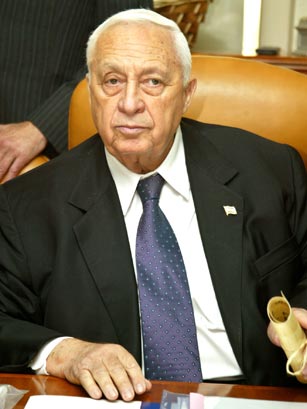
Israeli Prime Minister Ariel Sharon opens a weekly cabinet meeting at this office. Sharon convened the cabinet for a vote expected to approve a U.S.-backed "road map" leading to Palestinian statehood, despite opposition from far-right ministers
Here was a rare sight: Ariel Sharon making a noisy private display of his commitment to peace. In his cabinet room last week, the Israeli Prime Minister exploded when ministers from his Likud Party questioned his professed intention to support President Bush's road map peace plan. "I will bring the road map to the cabinet!" Sharon shouted. "I heard some of you said I won't get a majority for it. O.K., we'll see who'll have the majority. I'll get it, don't worry." The ministers kept silent, but none was cowed. They know Sharon will have a battle on his hands if he goes ahead with what Israelis see as the road map's massive concessions to the Palestinians. Besides, despite Sharon's cabinet histrionics, many of his ministers just do not believe that the former general — who sees Israel's entire history as one continuous battle and himself as the leader who never stopped fighting — will really push ahead with the new peace plan.
This forceful figure looms large over any hopes for peace — and no one but Sharon can know at this stage whether he intends to make a genuine effort. That is a measure of his checkered history, which leaves many divided over the rock-bottom question: Is it in Sharon to do a deal with the Palestinians? But the uncertainty is also a reflection of where Israelis stand at this juncture in the long, bitter conflict: after 31 months of violence, they care more for their immediate safety and have lost trust that peaceful coexistence is possible.
Last week the Bush Administration stepped in with a long-promised plan that would require hard-liners — not just in Israel but in the West Bank and Gaza and in Washington as well — to give diplomacy a chance. Even if the leaders of all three parties go at it with genuine vigor, few around them are optimistic that this plan, any more than the three others that preceded it in the last five years alone, will succeed. And the question most observers are already asking is whether Bush, Sharon or the newly installed Palestinian Prime Minister Mahmoud Abbas will — or can — even try very hard.
The U.S. President, for one, has been backed into playing an active role. The road map Bush unveiled with strikingly little fanfare last week was drawn up months ago by a quartet of co-sponsors including the European Union, the U.N. and Russia, and its contents have been known since last fall. Bush finally got behind it last week because he had promised his European — read British — and Arab allies that if they stuck with him through the war in Iraq, he would pursue the Arab-Israeli peace they consider just as urgent. He is also in the strongest position of any U.S. President since his father a decade ago to make Mideast negotiations move forward. Bush has promised he'd push before, then done little to follow through, so it's hardly surprising if both Israelis and Palestinians remain skeptical that this time, he will.
Facing Bush from one corner is Israel's tough-guy Prime Minister, whose resistance to being pushed around is legendary. Most Israelis believe Sharon's resolve is responsible for the hard-won benefits of his two years in office. Most importantly, Sharon has restored their sense of security after repeated suicide bombings that have killed more than 750 Israelis — a feat he accomplished largely by entrenching soldiers in Palestinian territory. If Palestinians pay for that with more than 2,300 deaths and Israeli soldiers camped permanently on their doorsteps, most Israelis are regretful but unapologetic. They also credit Sharon with maneuvering his old enemy Yasser Arafat from his position at the core of Palestinian power. Taking advantage of receptive policymakers in Washington, Sharon persuaded the Bush Administration that Arafat backed terrorism and therefore was no partner for peace. Together the U.S. and Israel tried to force Arafat to cede his primacy to the new Palestinian Prime Minister.
Sharon could be happy if his legacy rested on the removal of Arafat from the scene. But now he is likely to face U.S. pressure to make political and diplomatic concessions on the way to a peace deal that will prompt anger at home if they aren't accompanied by real change from Abbas. Sharon knows, for example, that withdrawing troops from the West Bank could open the gate for Palestinian extremists to step up the bombing once more.
As Sharon sees it, he can sell the road map to the Israeli public only if there is first evidence that Abbas will arrest suicide bombers and crush their networks. That is supposed to be an immediate Palestinian commitment under phase one of the plan. But already both sides are engaged in a "Who goes first?" debate. The road map calls for them to take their initial steps simultaneously. But Sharon wants violence quelled before Israel takes any action (and Bush last summer demanded the same), and Palestinians say Israel must not be allowed to wait before implementing its commitment to freeze all building in West Bank and Gaza Strip settlements.